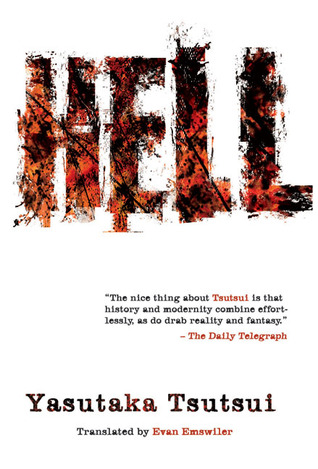 By YASUTAKA TSUTSUI (Alma Press; 2003/09)
By YASUTAKA TSUTSUI (Alma Press; 2003/09)
A very odd, and very culturally specific, look at Hell from a noted Japanese science fiction writer. Yasutaka Tsutsui’s output, little known in the US but quite famous in Japan, includes the source novel for the anime classic PAPRIKA (2006), and if you’ve seen that mindbender you’ll have some idea of the loopy nature of Tsutsui’s HELL. There’s no fire and brimstone in this inferno, which functions as essentially a vast waking dream whose inhabitants are able to move back and forth through time and telepathically experience each others thoughts.
The novel’s construction is odd (at least from a Western standpoint) in the way it interweaves the exploits of several Japanese folk who’ve landed in Hell by flashing back and forth, unexpectedly and seemingly haphazardly, between present and flashback. Said flashbacks are among the book’s most startling and moving sequences, such as a reminiscence by a taxi driver of how he died by crashing his car due to a fogged window and an actor’s recollection of a desperate dash through a labyrinthine basement underneath a stage.
Among the characters are three childhood friends, one of them a Yakuza, and their respective wives and mistresses. There’s also a famous writer and his actress companion (who realize they’re in Hell only after a descending elevator they’re trapped in stops on floor 666) and a homeless man who comes to in Hell after freezing to death along with his beloved wife.
These peoples’ existence in Hell is centered around a bar called the Night Walker where dream and reality converge. In the midst of it all two women who romanced the same man are able to recognize that fact upon passing each other, just as two men can jointly communicate with a still-living woman who was wife to one of them and mistress to the other. The most memorable sequence occurs during a movie the Yakuza character watches of his own murder, in which he discovers that he can literally pass through the screen and confront his murderers.
Adding to the oddness is Yasutaka Tsutsui’s disarmingly low key style, which relates everything from an intense torture sequence to a seemingly mundane train ride with the same relaxed, even-handed tone. The novel is short and quite easy to read, yet it tackles some profoundly weighty themes: the nature of life, death and beyond. A full understanding requires some heavy lifting on the part of the reader, which I’m sure will curtail its potential audience. I don’t know that I liked it all that much myself, although its enigmas did seem worth decoding—or at least pondering.
